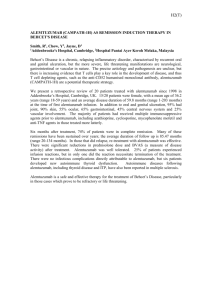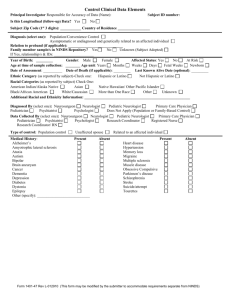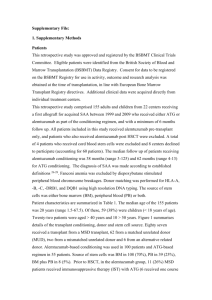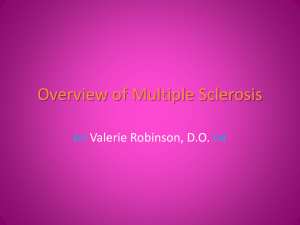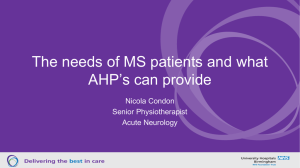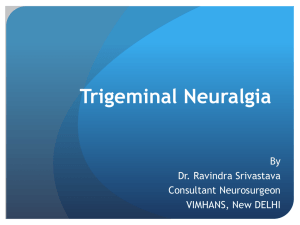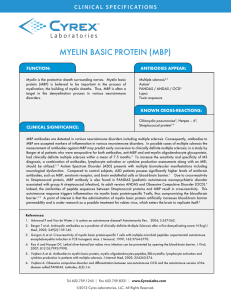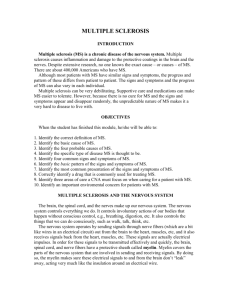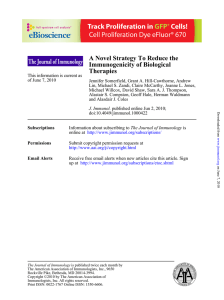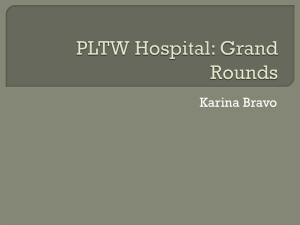Alemtuzumab information
advertisement
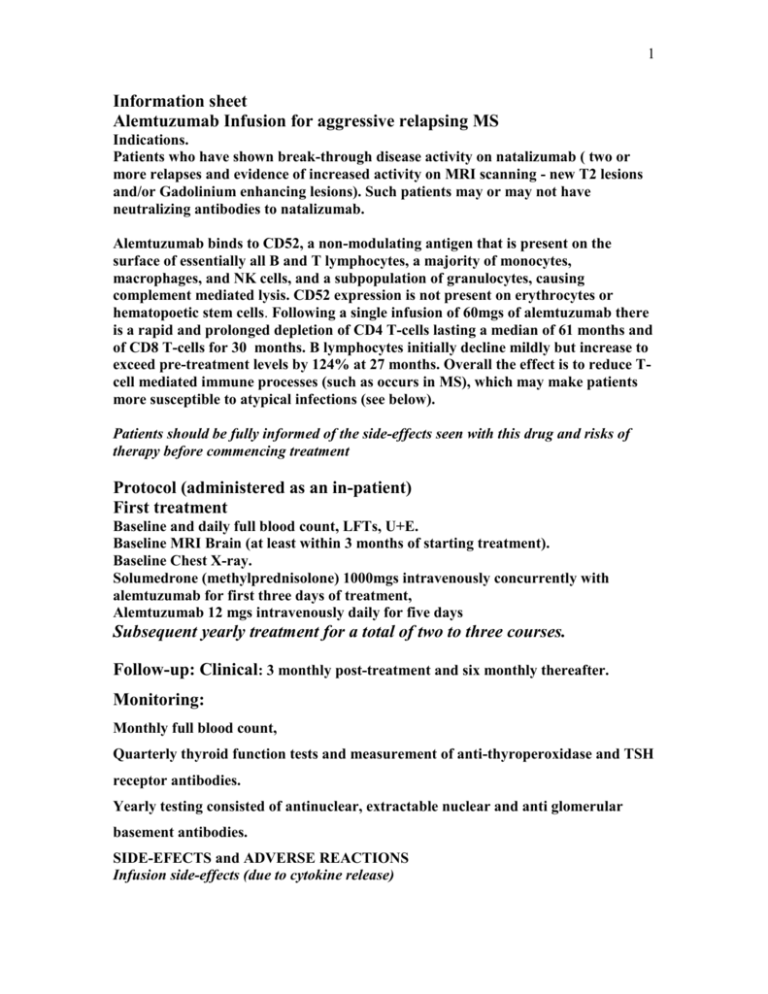
1 Information sheet Alemtuzumab Infusion for aggressive relapsing MS Indications. Patients who have shown break-through disease activity on natalizumab ( two or more relapses and evidence of increased activity on MRI scanning - new T2 lesions and/or Gadolinium enhancing lesions). Such patients may or may not have neutralizing antibodies to natalizumab. Alemtuzumab binds to CD52, a non-modulating antigen that is present on the surface of essentially all B and T lymphocytes, a majority of monocytes, macrophages, and NK cells, and a subpopulation of granulocytes, causing complement mediated lysis. CD52 expression is not present on erythrocytes or hematopoetic stem cells. Following a single infusion of 60mgs of alemtuzumab there is a rapid and prolonged depletion of CD4 T-cells lasting a median of 61 months and of CD8 T-cells for 30 months. B lymphocytes initially decline mildly but increase to exceed pre-treatment levels by 124% at 27 months. Overall the effect is to reduce Tcell mediated immune processes (such as occurs in MS), which may make patients more susceptible to atypical infections (see below). Patients should be fully informed of the side-effects seen with this drug and risks of therapy before commencing treatment Protocol (administered as an in-patient) First treatment Baseline and daily full blood count, LFTs, U+E. Baseline MRI Brain (at least within 3 months of starting treatment). Baseline Chest X-ray. Solumedrone (methylprednisolone) 1000mgs intravenously concurrently with alemtuzumab for first three days of treatment, Alemtuzumab 12 mgs intravenously daily for five days Subsequent yearly treatment for a total of two to three courses. Follow-up: Clinical: 3 monthly post-treatment and six monthly thereafter. Monitoring: Monthly full blood count, Quarterly thyroid function tests and measurement of anti-thyroperoxidase and TSH receptor antibodies. Yearly testing consisted of antinuclear, extractable nuclear and anti glomerular basement antibodies. SIDE-EFECTS and ADVERSE REACTIONS Infusion side-effects (due to cytokine release) 2 Rashes are common, seen in 44% of the series of Hirst et al.,2008 usually occuring in the infusion period. Headaches during infusion, chest tightness, wheeze, pyrexia with rigors. Abnormal liver function tests. Transient worsening of pre-existing neurological deficits due to a cytokine release effect, usually prevented by the concomitant infusion of steroids in protocol. Short term adverse effects Infective episodes.: urinary and chest infections, mouth ulcers, thrush, recurrence of digital warts. Thrombocytopenia Longer term side-effects Auto-immune disorders The autoimmune diseases observed after the administration of alemtuzumab are predominantly antibody-mediated, and they respond to B-cell depletion. Autoreactive B cells can function without T-cell help; thus, the emergence of autoreactive B cells during the reconsititution of lymphocytes may cause autoimmunity after treatment with alemtuzumab. Hyperthroidism (increased activity of the throid gland). Most striking is a report of a 33% incidence of Graves disease with raised TSH receptor antibodies developing at a mean of 18 months post treatment in a cohort of 27 patients but other subsequent studies have shown a much lower frequency of thyroid abnormalities There is one report of renal failure due to anti-glomerular basement antibodies, requiring renal transplantation in a woman who was given 100 mgs of alemtuzumab for her MS. Idiopathic Thrombocytopenic Purpura (ITP): Antibody mediated depletion of circulating platelets causing a bleeding disorder which can be life threatening. However this is rare, 3/334 patients in one study, and the prevalence of low platelet counts in other studies is low and the counts were only mildly reduced Regular monthly monitoring of platelet counts are needed. Other immunological changes include changes in auto-antibodies unaccompanied by symptoms. Very long term effects Alemtuzumab causes long term lymphocyte suppression. The number of MS patients treated with this drug and the duration of follow-up in MS patients has been relatively short. The risks for long term effects in relation to immunosuppression such as malignancy, opportunistic infections or progressive multifocal leucoencephalopathy are unknown. References: Clatworthy MR, Wallin EF, Jayne DR. Anti-glomerular basement membrane disease after alemtuzumab. N Engl J Med. 2008;359:768-9. Menge T, Weber MS, Hemmer B, Kieseier BC, von Büdingen HC, Warnke C, Zamvil SS, Boster A, Khan O, Hartung HP, Stüve O. Disease-modifying agents for multiple sclerosis: recent advances and future prospects. Drugs 2008;68:2445-68. 3 CAMMS223 Trial Investigators, Coles AJ, Compston DA, Selmaj KW, Lake SL, Moran S, Margolin DH, Norris K, Tandon PK. Alemtuzumab vs. interferon beta-1a in early multiple sclerosis. N Engl J Med. 2008;359:1786-801. Buttmann M, Rieckmann P. Treating multiple sclerosis with monoclonal antibodies. Expert Rev Neurother. 2008;8:433-55. Hirst CL, Pace A, Pickersgill TP, Jones R, McLean BN, Zajicek JP, Scolding NJ, Robertson NP. Campath 1-H treatment in patients with aggressive relapsing remitting multiple sclerosis. J Neurol 2008;255:231-8. Jones JL, Coles AJ. Campath-1H treatment of multiple sclerosis. Neurodegener Dis. 2008;5:27-31. Review. Muraro PA, Bielekova B. Emerging therapies for multiple sclerosis. Neurotherapeutics. 2007;4:676-92. Coles AJ, Cox A, Le Page E, Jones J, Trip SA, Deans J, Seaman S, Miller DH, Hale G, Waldmann H, Compston DA. The window of therapeutic opportunity inmultiple sclerosis: evidence from monoclonal antibody therapy. J Neurol 2006;253:98-108. Coles A, Deans J, Compston A. Campath-1H treatment of multiple sclerosis: lessons from the bedside for the bench. Clin Neurol Neurosurg 2004;106:270-4. Paolillo A, Coles AJ, Molyneux PD, Gawne-Cain M, MacManus D, Barker GJ, Compston DA, Miller DH. Quantitative MRI in patients with secondary progressive MS treated with monoclonal antibody Campath 1H. Neurology 1999 ;53:751-7. Coles AJ, Wing MG, Molyneux P, Paolillo A, Davie CM, Hale G, Miller D, Waldmann H, Compston A. Monoclonal antibody treatment exposes three mechanisms underlying the clinical course of multiple sclerosis. Ann Neurol 1999;46:296-304. Moreau T, Coles A, Wing M, Thorpe J, Miller D, Moseley I, Issacs J, Hale G, Clayton D, Scolding N, Waldmann H, Compston A. CAMPATH-IH in multiple sclerosis. Mult Scler 1996 ;1:357-65. Moreau T, Coles A, Wing M, Isaacs J, Hale G, Waldmann H, Compston A. Transient increase in symptoms associated with cytokine release in patients with multiple sclerosis. Brain 1996;119 :225-37.
